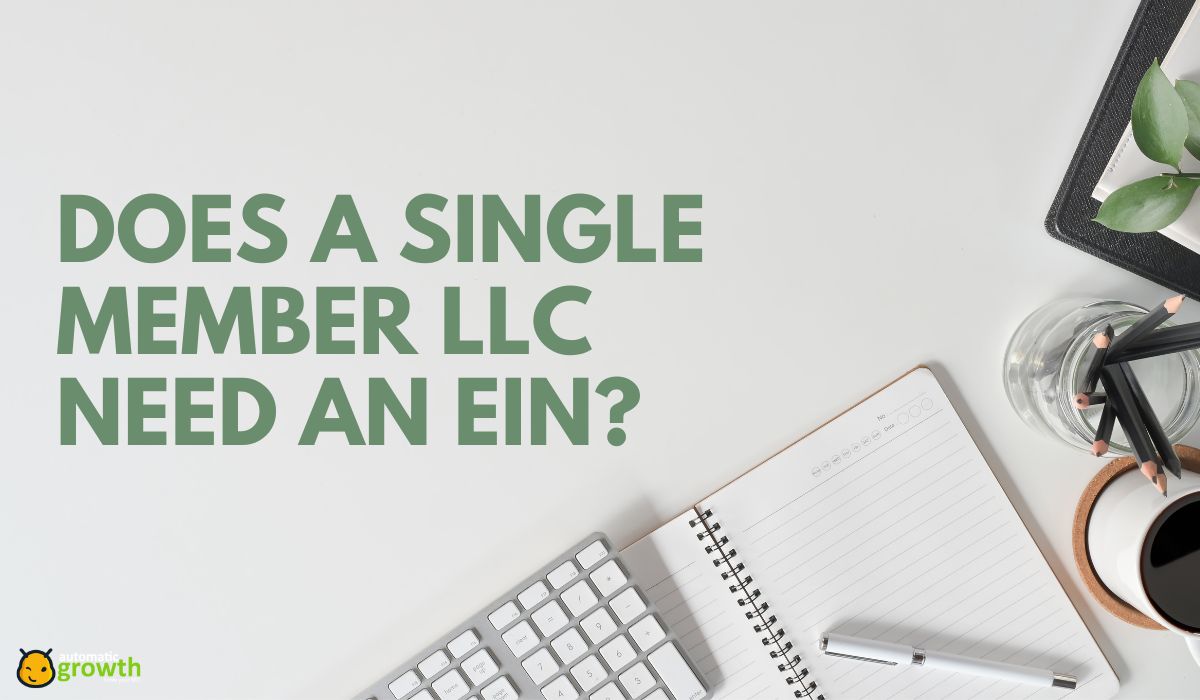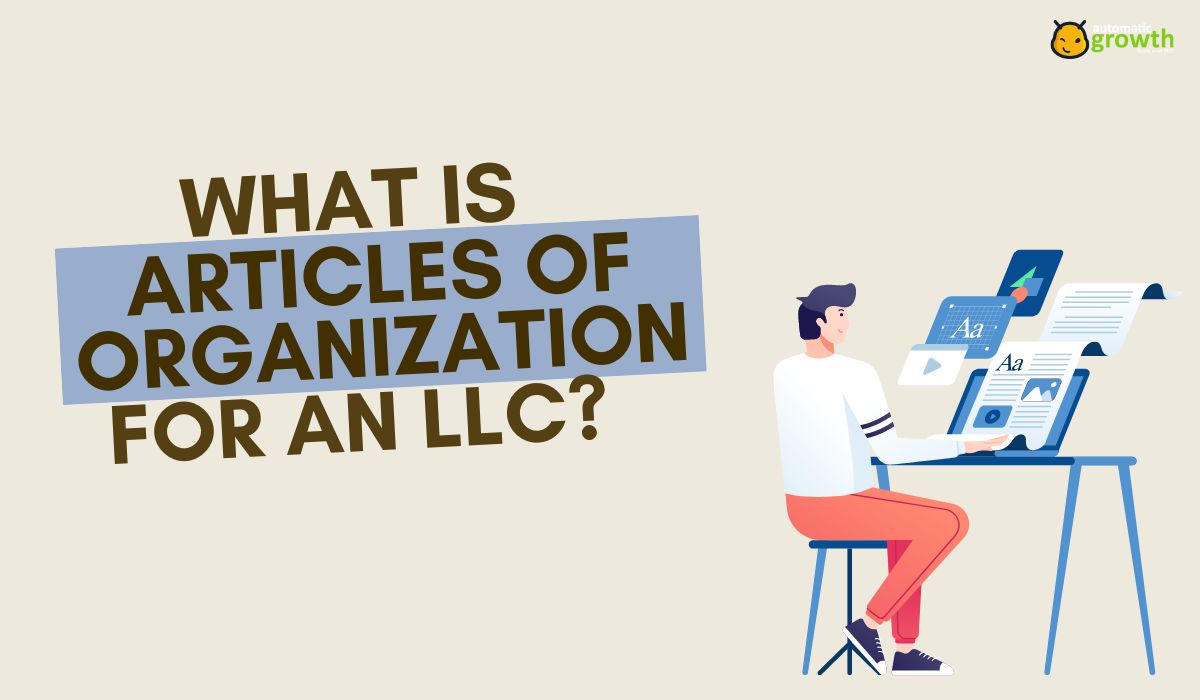Are you wondering if you need an Employer Identification Number (EIN) while starting a single-member LLC? This blog post investigates whether these LLCs require an EIN, commonly referred to as a Federal Tax ID.
It talks about how having an EIN helps with credit, hiring, and bank accounts. It describes the application procedure, emphasizing how it helps to keep personal and corporate finances apart and the tax ramifications.
Single Member LLC and EIN Requirements
Federal Tax Purposes
When filing taxes, a single-member LLC that does not have any workers or certain excise taxes may utilize the owner's Social Security number in lieu of an EIN. This is true for businesses run as sole proprietorships. However, an EIN is required for payroll taxes when recruiting staff or establishing a retirement plan.
Business Bank Account
To encourage financial segregation from personal assets, banks frequently demand an EIN from single-member LLCs in order for them to open business accounts. Additionally, by supporting the LLC's status as a distinct legal entity, an EIN increases company credibility with suppliers and contractual partners.
Tax Identification for Single-Member LLCs
Using the Owner's Social Security Number
Tax reporting is made simpler for single-member LLCs without employees by allowing the owner's SSN to be used for tax reasons. To simplify tax requirements, a freelance graphic designer running a single-member LLC, for example, can use their SSN rather than an EIN.
Benefits of Obtaining an EIN
For taxation purposes, an EIN keeps the owner's personal identity distinct from the business and shields the SSN from prying eyes. It improves privacy when communicating with suppliers or customers. Furthermore, because it is official documentation separate from the owner's personal SSN, an EIN makes it possible to register a business bank account and presents a professional image.
Differences Between Single-Member LLC and Sole Proprietorship
Limited Liability Protection
Unlike a sole proprietorship, a single-member LLC provides limited liability protection for personal assets against business liabilities. Although an LLC has the option to choose corporate taxation, both are taxed as pass-through businesses.
Formation Process
While a sole proprietorship forms automatically with the start of a business, an LLC must file articles of organization with the state in order to form. This contrast emphasizes how LLCs must obtain an EIN, particularly if they want to become corporations or hire employees.
Applying for an EIN as a Single-Member LLC Owner
Online Application
Owners of single-member LLCs can quickly and easily apply for a free EIN online at the IRS website. The simple process, which just needs some basic business information, may be completed in a matter of minutes and results in the instant issuing of an EIN.
Benefits of Immediate Issuance
LLC operators are able to apply for licenses and open commercial bank accounts right away, thanks to the prompt availability of an EIN. This timely issuance helps with vendor and client transactions by facilitating the early development of business identity.
Tax Obligations of a Single-Member LLC
Federal Tax Treatment
Profits and losses for single-member LLCs are recorded on the owner's personal tax return because they are regarded as disregarded companies for federal tax purposes. An LLC of this type makes $50,000 in profit, for instance, and the owner reports it on their tax return. Self-employment taxes, such as Social Security and Medicare, apply to these earnings.
Need for EIN
For a single-member LLC with workers or certain tax obligations, an EIN can be required. For commercial banking, financial institutions may also need an EIN, even if the IRS does not impose it.
Pros and Cons
Benefits include increased control over income and deductions and easier tax reporting. Comparing single-member LLCs to multi-member LLCs or larger organizations, single-member LLCs offer less liability protection.
Benefits of Having an EIN for a Single-Member LLC
Employing People and Creating Retirement Plans
A single-member LLC cannot hire staff or provide benefits like 401(k) plans without an EIN. It makes worker expansion possible, which is essential for expanding companies.
Establishing Credit and Improving Your Professional Image
To protect personal assets, an EIN keeps the credit history of the business distinct from that of the owner. Employing a unique identity in place of the owner's SSN, also improves the LLC's reputation as a professional business when interacting with suppliers and customers.
An EIN establishes a separate credit history, facilitates employee recruiting and retirement plan setting, and raises the company's perceived legitimacy in the industry.
Choosing the Right Tax Status for Your Single Member LLC Business
Tax Status: Single-member LLCs may choose to use IRS Forms 8832 or 2553 to elect corporate taxation or to be taxed as a sole proprietor. This decision affects tax identification: corporations need an EIN, whereas sole proprietorships utilize the owner's SSN. For the best tax option, speaking with a tax expert is advised.
Consequences
Various criteria, such as banking, employment, credit, and state restrictions, determine whether an EIN is required. For instance, recruiting staff and opening commercial bank accounts both normally ask for an EIN. Although utilizing an SSN may be more straightforward, it's important to weigh all operational and legal ramifications before making a decision.
Managing Taxes as a Single-Member LLC
Keeping Accurate Records
Accurate documentation of all financial activities, including bank statements, invoices, and receipts, is essential for single-member LLCs. Maintaining proper tax filings and tracking federal tax liabilities, including possible excise taxes, requires these documents.
Paying Estimated Quarterly Taxes
To prevent underpayment penalties, single-member LLCs should pay estimated quarterly taxes. Maintaining tax compliance is facilitated by estimating annual tax liability and making timely payments. A professional accountant's advice or the use of accounting software can help in efficiently handling these tax and financial obligations.
Conclusion
Business owners must comprehend that a single-member LLC requires an EIN. It effects the LLC's financial stability, helps with tax compliance, and keeps finances separate. It's critical to make well-informed decisions regarding duties and tax status. It is recommended to seek the advice of a tax professional for comprehensive tax assistance to ensure compliance and optimize financial plans for success.
Are you wondering how many LLCs you can have? Look more into it from our blogs at Automatic Growth today.
















